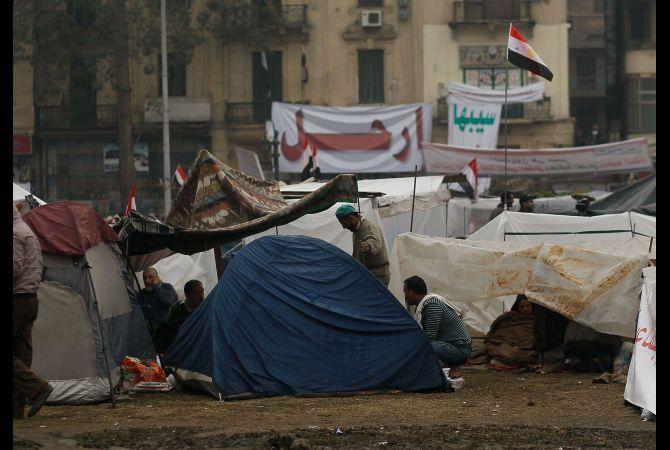Egypt: Drafting the way forward
Anti-Mubarak protesters by tents in the middle of Tahrir Square Feb. 5. Inside a tent like this, a youthful coalition drafted a "birth certificate" for a free Egypt on Feb. 11, 2011.
CAIRO, Egypt — The future of Egypt was being drafted on a piece of cardboard inside a tent by the glow of a flashlight last night.
With a backdrop of fireworks and the thunderous sound of a million people rejoicing at the toppling of Hosni Mubarak, a group of six young people from the Revolutionary Youth Council were huddled in a four-man tent in Tahrir Square.
They were drafting a communique to mark the revolution and to try to create some baselines for how they believe the country can plot a way forward, dubbing their statement “the birth certificate of a free Egypt.”
They were all representatives from the five leading organizations that make up the coalition that helped to plan and coordinate the 18 days of protest that allowed Egypt to take down a tyrant and write their own history.
The council, which seemed to have several different names depending on who you asked and how they translated it, had representatives from the camp of opposition leader Mohamed El-Baradei, another from the April 6th movement, from the Muslim Brotherhood, and other movements. They were all deliriously happy as they worked together on the statement.
They didn’t have enough paper so Islam Lotfy, a 29-year-old lawyer and member of the Muslim Brotherhood’s youth movement, ripped a top off a cardboard box and began serving as scribe for the committee.
They laid out several goals for the new government that will form in the weeks and months ahead including the drafting of a new constitution that will limit the authority of the president and they called for the disbanding of parliament.
They also applauded the military for showing considerable restraint in the days of protest and pointedly asked the powerful military, which technically is in control of the country of 80 million people as of last night, to ensure a smooth transition to civilian government.
They also called for recognition of the more than 300 “martyrs” of the revolution, writing, “History will remember those who’ve written with their blood the birth certificate of a free Egypt.”
When the council members had agreed on the language of the communique, a committee member began typing it out on their Blackberry and immediately posted it on the group’s Facebook page.
Sally Moore, a Coptic Christian who is an El Baradei supporter, said, “It’s the Facebook revolution. We started with 100 people on Facebook and we finished with millions of people taking to the streets and demanding that Mubarak step down.
“We did it!” she said, breaking away to hug a fellow protester.
“We have written our own history here today,” said Lotfy, emerging from the tent to hug friends in the crowd.
“But we have to focus now on writing the future and we still have a lot of work to do,” he said.
Indeed, Egypt faces daunting challenges in reforming its government after 30 years of autocratic rule in which a corrupt regime enforced its power through brutality and a constitution that was set in the shadows by a so-called “emergency law” which granted the presidency extraordinary powers.
When Mubarak stepped down, he turned control of the government over to the military, which traditionally has been a proud and widely popular institution in Egypt.
With the military in power, many questions remain as to what role Vice President Omar Suleiman will play in the transition.
There were also uncertainties how the constitution will be rewritten in advance of new parliamentary and presidential elections as the Arab world’s most populous country seeks to re-establish itself as a democracy.
A new Egypt will also have much work to do to make up for the devastating impact the revolution has had on its economy, particularly in the estimated $11 billion-a-year tourism industry which has been crippled by the unrest.
But after an 18-day, tumultuous, emotional and sometimes violent ride toward overthrowing a U.S.-backed dictatorship, the people of Egypt gathered in Tahrir Square just wanted to celebrate.
Car horns blared and people waved Egyptian flags. Protesters climbed atop the tanks that surrounded the square and took snapshots with soldiers who smiled for the photos.
One man with a young boy on his shoulders shouted up to three soldiers flanking the cordon of barbed wire that had been erected at checkpoints into the square.
“We’re counting on you to help us. Don’t let us down!” he said.
Protesters inside the square danced in the streets and they hugged each other and many wept.
A man named Abbas removed his glasses to brush away tears as he shouted into the night air, “We are free. We are free. We have our country back.”
Together, the crowd sang along to the country’s national anthem, which blared and distorted on loud speakers in the square.
The title of the anthem is “Biladi,” which translates as “my country.”
At one point the crowd was chanting rhythmically in Arabic, “Hold your head high, you’re an Egyptian.”
This story is presented by The GroundTruth Project.
We want to hear your feedback so we can keep improving our website, theworld.org. Please fill out this quick survey and let us know your thoughts (your answers will be anonymous). Thanks for your time!
